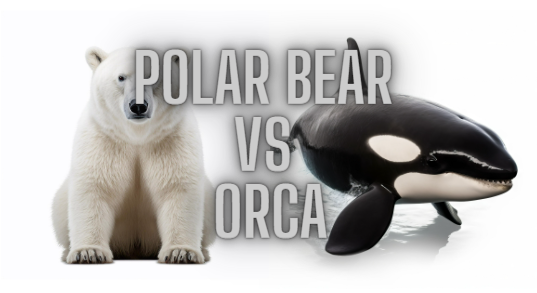The natural world is filled with incredible predators, and few rival the majesty and power of the polar bear and the orca, also known as the killer whale. These iconic creatures inhabit different realms—the polar bear roaming the icy Arctic and the orca dominating the vast oceans. In this article, we delve into the captivating clash between these apex predators, exploring their unique characteristics, hunting strategies, and the potential outcome if they were to confront each other.
Polar bears (Ursus maritimus) are the largest land predators on Earth, supremely adapted to the Arctic environment. These magnificent creatures have a distinctive white coat that provides camouflage against the snowy landscape. Beneath their fur, polar bears boast a thick layer of blubber, which insulates them from the cold and aids buoyancy while swimming. With a massive frame and powerful limbs, adult males can reach weights of up to 1,500 pounds (680 kilograms) and lengths exceeding 10 feet (3 meters).
Orcas (Orcinus orca), commonly known as killer whales, are the largest members of the dolphin family. These highly intelligent and social marine mammals are renowned for their striking black and white coloration and their impressive size. Adult orcas can measure up to 32 feet (9.8 meters) long and weigh up to 6 tons (5,400 kilograms). They possess a sleek and streamlined body, along with a powerful tail fluke that propels them through the water with remarkable speed and agility.
Hunting Strategies
As formidable hunters, polar bears mainly prey on seals, their primary food source. They exhibit great patience and stealth while waiting for seals to surface through breathing holes in the ice. Once in close proximity, polar bears employ a burst of speed and powerful forelimbs to seize their unsuspecting prey. Their powerful jaws and sharp teeth allow them to deliver swift and lethal bites to subdue their catch. Additionally, polar bears scavenge on carcasses and have been known to eat smaller marine mammals and fish when opportunities arise.
Orcas are apex predators that occupy the top of the marine food chain. They have a diverse diet, which includes fish, squid, marine mammals such as seals and sea lions, and even other species of whales. Orcas are known for their highly coordinated hunting techniques, often employing teamwork to capture prey. They use various strategies, such as herding fish into bait balls or creating waves to knock seals off ice floes. Orcas are formidable swimmers, capable of reaching speeds of up to 34 miles per hour (55 kilometers per hour), giving them an advantage in pursuing and capturing their prey.
Potential Confrontation
In nature, the encounter between a polar bear and an orca is a rare occurrence due to their distinct habitats. However, if we were to hypothetically consider a confrontation between these two predators, several factors would influence the outcome.
If a polar bear and an orca were to meet on land, such as near the coast or on an ice floe, the polar bear would have the advantage. Polar bears are powerful and agile on land, while orcas are not adapted for terrestrial locomotion. The polar bear’s size, strength, and sharp claws would give it an upper hand in a direct confrontation.
In the ocean, where orcas are perfectly at home, the tables would turn. Orcas are highly skilled swimmers, possessing speed, agility, and a keen sense of teamwork. Their powerful jaws and teeth allow them to deliver powerful bites, and they have been observed preying on other marine mammals larger than themselves. In the water, orcas would likely outmaneuver a polar bear and use their superior aquatic abilities to their advantage.
Final Thoughts
While it’s intriguing to imagine a face-off between a polar bear and an orca, these encounters are extremely rare, if they occur at all. These apex predators occupy separate domains—the polar bear dominating the icy realms of the Arctic, and the orca reigning supreme in the vast oceans.
In a hypothetical confrontation, the outcome would heavily depend on the environment and specific circumstances. On land, the polar bear’s size and strength would likely give it the advantage. In the water, the orca’s speed, agility, and hunting prowess would likely prevail.

